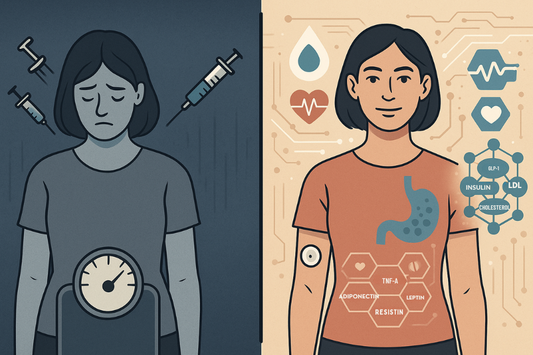What is The IBS-SIBO Solution?
If you want to know more details about the course please join our waitlist and we will keep you informed.
It is a hybrid end to end approach that uses the best in technology, the full range of treatment options, comprehensive nutritional support, group sessions, as well as 1:1 consultation.
Members of our waitlist will receive VIP treatment and get a sneak peek of our amazing new IBS SIBO Solution.
You can earn points to move up the line and get rewards including free access to the programme. Scroll down in the sign-up box to see details.
Got bloating? IBS? Have you heard of SIBO?
SIBO (small intestinal bacterial overgrowth) causes digestive symptoms like gas and bloating, diarrhoea and constipation, malabsorption of food, and weight gain. It also causes sufferers to restrict their diet. Non-digestive symptoms include brain fog, low mood and depression, muscle and joint aches, brain fog, skin problems … the list goes on. It is a key driver of poor health, both in the short and long term.
humanpeople are launching a new Health 3.0-styled IBS-SIBO solution. If you, or anybody you know, suffers from gas and bloating or digestive issues please share this article.
The IBS-SIBO Solution is a patient-centred approach developed by both Doctors and nutritionists.
We want to make treating SIBO better. Based on our 20 years of combined experience we want to make it easy to access, effective, and affordable. We get it. It’s frustrating and our mission is to help you.
How common is SIBO?
A recent analysis of 1,534 people we have helped at humanpeople has revealed that 54% of our users have significant gut issues. If you think you may have SIBO and want to get tested you can do our SIBO questionnaire and find out more about SIBO testing here.
Not only does this group suffer from gut issues, but they also suffer significant non-digestive issues. Of these:
- 64% reported significant fatigue and tiredness
- 43% had brain fog
- 54% a significant reduction in libido.
Energy levels are in the doldrums. Hives, sinusitis, aching joints, soft tissue injuries, eczema, rosacea and weight gain are all common. Most people have lived with this problem for years, even decades, unaware that it can be fixed.
Many have gone on to suffer from even more significant health issues: 5.4% reported having being diagnosed with Hashimoto’s thyroiditis, compared to 1-2% off the normal population, and 5.1% have fibromyalgia.
What do they have in common? They all have a condition called SIBO, which is caused by bacterial overgrowth in the (nearly) sterile mucus of the small intestine. A report from Lincoln University published in Nature estimated that about half of people with IBS actually have SIBO.
If you think you ight have SIBO
How does treating SIBO improve longevity?
At humanpeople we focus on personalised health and longevity.
Whilst this means optimising or hacking pathways to improve health, it is just as important to remove problems that accelerate poor health. The difficulty in accessing a solution for poor gut health is such a big issue that we felt compelled to bring together a team and tech to address that problem.
Our pilot study was resoundingly succesful and so we are now in the position to grow the programme.
Our unique solution incorporates FoodMarble’s cutting edge home breath testing device, experienced nutritionists from the team at Nutripath, and Medical Doctors to offer a single complete solution.
It is a hybrid approach of health-tech, online learning, personalised treatments, nutrition, group sessions and 1:1 advice. A modular approach will allow you to treat your SIBO regardless of what stage of the journey you are on. We are also offering access to the course for healthcare colleagues who feel their patients could benefit (for healthcare professionals contact help@humanpeople.co if you are interested in knowing more).
What is SIBO?
SIBO (small intestinal bacterial overgrowth) occurs when micro-organisms manage to colonise the small intestine. In a healthy person, this 7.5 metre long tube is lined by a protective mucus layer. This mucus is essentially sterile, but if there are as little as 1,000 bacteria per ml in this fluid, this is defined as too much, or bacterial overgrowth.
The presence of significant amounts of bacteria means that they ferment food that is passing through the small intestine and produce gas as a by-product. Our digestive system does not produce gas – it is only the bacteria that do so and this should only happen much further down in the large intestine (gut microbiome).
If these micro-organisms take hold, they damage the structure of the gut wall and the body struggles to keep out unwanted bacteria and toxins.
The presence of bacteria, toxins, or particles called LPS (lipopolysaccharides), in the rest of the body is picked up by the immune system that then goes into overdrive.
So, you can see that treating SIBO goes way beyond just removing the bacteria – the gut wall also needs to be restored to normal function before the immune system can reset back to normal. A failure to understand this is a key reason for failure in treating SIBO.
How do you diagnose SIBO?
The first step is to diagnose if there are bacteria present and this represents the first challenge.
To access the small intestine is difficult and collecting a sample can also be problematic, but doing exactly this is how researchers have managed to understand what is going on.
If bacteria are present in significant numbers they will ferment food in the small intestine and produce hydrogen and methane gas. These gases are then expelled in the breath and can be detected through breath analysis, which is how the presence of bacteria in the small intestine can be detected.
humanpeople have teamed up with breath-testing experts, FoodMarble, who have an FDA approved clinical device and app which allows users to test from the comfort of their home and sends the analysis directly to us. This fantastic piece of healthtech is a real breakthrough in testing as it can be used multiple times to aid in succesful treatment.
How do you treat SIBO?
There are several steps to successfully treating SIBO and healing the gut. The first is to use therapeutics, in the form of herbal antimicrobials or antibiotics along with a proprietary blend of biofilm busters and gut support. This will kill off the micro-organisms over a 2-4 week period. During this time, a specially modified diet will help to support the digestive system whilst removing the fuel for the bacteria to thrive.
Once the “killing stage” has been completed, we can then start to think about repairing the damage that has been done. 19% of our patients have significant mucus in their stool, which signifies an immune system struggling to deal with an ongoing problem. Repairing the gut barrier, restoring normal digestion, and rebalancing the immune system can all take time. If not done properly there is a 44% recurrence rate at 9 months.
Understanding the why of SIBO? Stopping recurrence.
Understanding why SIBO has occurred in the first place is critical to stopping recurrence.
- Impaired intestinal motility: This refers to the ability of the muscles in the digestive tract to move food and waste through the system. When there is a problem with this process, such as in conditions like gastroparesis or scleroderma, it can lead to SIBO. According to some estimates, impaired intestinal motility is responsible for about 50% of SIBO cases. Food poisoning followed by an autoimmune attach on the MMC (migrating motor complex) that co-ordinates normal motility is thought to be a key cause.
- Structural abnormalities: Certain structural abnormalities in the digestive tract, such as strictures or adhesions, can cause a buildup of bacteria in the small intestine. This is estimated to be responsible for approximately 20% of SIBO cases.
- Low stomach acid: Stomach acid plays an important role in killing off bacteria that enter the digestive tract. When there is not enough stomach acid, such as in cases of chronic proton pump inhibitor (PPI) use, or achlorhydria, it can increase the risk of SIBO. Low stomach acid is estimated to be responsible for around 15% of SIBO cases.
- Immune system dysfunction: The immune system plays a role in keeping bacteria in check throughout the body, including in the digestive tract. When there is dysfunction in the immune system, such as in cases of HIV/AIDS or immunodeficiency disorders, it can lead to SIBO. This is estimated to be responsible for approximately 10% of SIBO cases.
- Other factors: There are several other factors that have been associated with an increased risk of SIBO, including a high-carbohydrate diet, alcohol consumption, and certain medications. These factors may account for the remaining 5-10% of SIBO cases.
Can I get treated by my GP in the UK?
Some Doctors in the UK understand SIBO and the link to IBS, but many do not. The breadth of knowledge of GP’s is enormous and it is sometimes unrealistic to expect them to know of every development in every field from obstetrics to ENT, psychiatry and gastroenterology.
As part of The IBS-SIBO Solution we will be able to offer testing and a formal diagnosis from a Doctor through a CQC registered platform (this is a UK requirement for diagnostic testing).
If you are looking to go down the antibiotic prescription route then you may have success in getting your GP to prescribe the expensive antibiotics needed to treat the condition.
When we use antibiotics we also give biofilm-busters along with other gut support, especially those to both stop fungal overgrowth and treat any fungal infection. We may also recommend soluble fibre like PHGG. Also remember that both nutrition and dealing with the root cause is essential for treatment and the prevention of recurrence.






